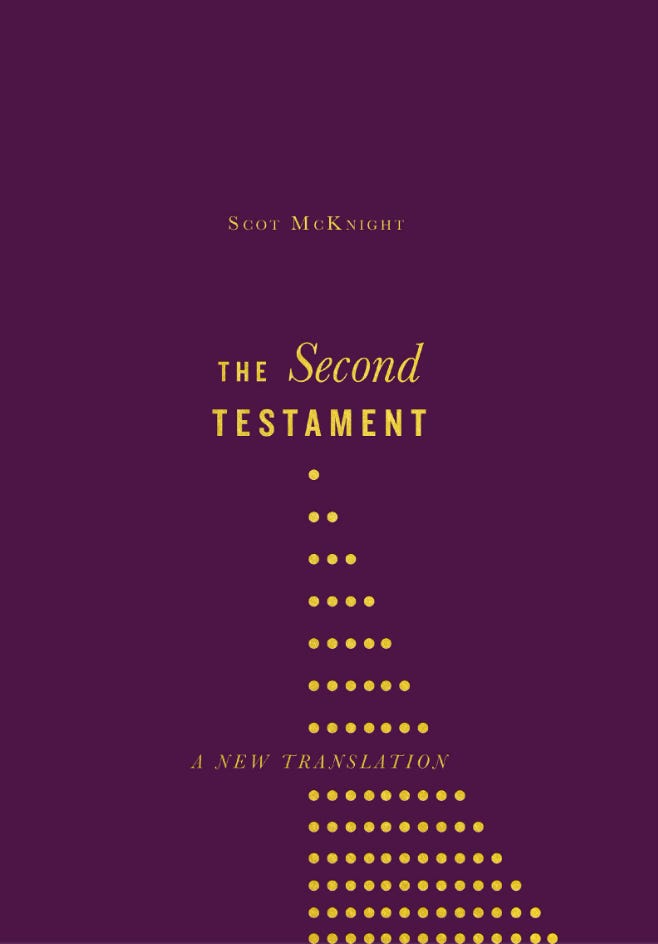I’m thrilled about my soon-to-arrive translation of the New Testament called The Second Testament: A New Translation. The translation’s publication date is 6 June and you can pre-order it here.
The basic theory at work in this translation can be summed up in these words: literal, chunky, sounds-more-like-Greek than standard translations (nothing against them), transliteration of names and places (like The First Testament), and somewhat disruptive for those who are familiar with their Bibles. Yes, I use some nonstandard translations of terms with which we are so familiar we don’t even see the words! Our prayer is this translation will slow readers down to hear the NT afresh. Feedback over the last year has confirmed the word “afresh” over and over. The Second Testament will surprise you often. It’s for those who are already Bible readers and are familiar with their translations. The Second Testament will at times prompt you to open your favorite translation to see what it has. That’s a win-win – for both of us.
I was Zoom-ing recently with an academic friend. He said, “I can’t wait for your translation. I just love those transliterated names.” Let me say a word. For years I have been irritated by translations converting names into English equivalents. At times it comes off as culturally and ethnically insensitive. Hebrew names and Greek names are Hebrew and Greek names, not English names. “James” is not the same as Yakōbos, and Yakōbos is not the same as Yaakov.
What do we lose when we translate into natural English equivalents? What do we gain when we transliterate those names and read Yēsous instead of Jesus? We gain cultural awareness. That could be a big gain for all of us, especially those of us in the dominant culture.
IVP’s The First Testament is an exceptional production. I love to hold and read The First Testament, and I love the fonts, and I love the paper and its color, and the inside of the cover. OK, it’s a handsome production. I’m honored that The Second Testament will stand next to The First Testament.
Let’s talk about the beautiful cover for The Second Testament. The choice of colors ended up being a discussion over a couple weeks. Back and forth from IVP to me. What I did, and I have often done this, was to pass on the color suggestions from the IVP design team to some of my students. What I like is that this group of students, with whom I have discussed covers of other books, is both theologically educated and artistically sensitive. We saw options of covers in teal and white and brown and other colors. One or two of us liked one and another one or two liked another, but there was nothing compelling about those options.
Bibles, you know, are mostly black. A black cover denotes a level of seriousness, not to ignore a black cover would express tradition. But black was not on the offer from IVP, in part because the “First Testament” by Goldingay was black.
Someone in our group suggested a dark purple to fit with the royal theme of Jesus’ vision of the kingdom as well as with a serious, even sacred, color.
That deep purple cover option IVP’s team sent us was compelling. We love it and hope you will as well.
I’m beside myself with these endorsement:
"Startling. Scot McKnight's translation flips and scatters our settled habits of thought about the New Testament. McKnight's striking prose in The Second Testament compels the reader to un-hear and then re-hear Scripture's message. I highly recommend it, because after the shakedown, you'll find that you've encountered God's Word afresh."
Matthew W. Bates, author of Why the Gospel? and professor of theology at Quincy University
"Translations produced by committees often reflect negotiations—quite often with well-intentioned ambiguity and ecumenical aims. A translation produced by an individual provides additional space for creativity and boldness, and this is precisely what we have with The Second Testament. McKnight's work is a stimulating glimpse into the original Greek and an encouragement to us all to consider our long-held translations. I look forward to the conversations it generates!"
Madison Pierce, associate professor of New Testament at Western Seminary
"Scot McKnight's translation of the New Testament takes us into the very world of Jesus and the apostles; it breathes the air of antiquity. Rather than try to make the New Testament too familiar, McKnight makes it sound foreign, like a distant land you are hearing about for the first time. The Second Testament is a monumental literary achievement that will enrich and excite readers for generations."
Michael F. Bird, academic dean and lecturer in New Testament at Ridley College in Melbourne, Australia
"Scot McKnight's The Second Testament translation offers surprises and causes us to rethink passages we thought we knew."
Lisa Bowens, associate professor of New Testament at Princeton Theological Seminary
You can pre-order The Second Testament right here.






Scot, pre-ordered and anxious to get it!
“What do we gain when we transliterate those names and read Yēsous instead of Jesus?”
I’ve always felt the same regarding Jesus —> Yeshua
If Jesus is a transliteration of Yēsous which is transliteration of Yeshua, is there any reason, other than sticking to Greek, to not insert Yeshua?
The gospel writers as well as other’s occasionally insert other languages into their writing. Was there consideration whether to do that here?
Thanks!
Gregg